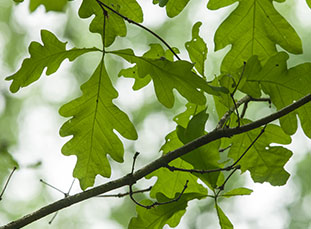Cooperages 1912 and American Forests Partner to Restore Native Oak Forests

American Forests is partnering with Cooperages 1912, a family-owned company crafting premium wine barrels, to establish an Oak Restoration Fund that will be used to implement a suite of restoration projects that sustain the environmental, economic and social benefits provided by oak forests. Projects will include tree planting, former mine land restoration, forest health treatments, and promotion of natural regeneration.
Across the United States, oak trees provide a host of natural benefits to society every day, including clean air and water, habitat and food for wildlife and long-term storage of carbon pollution. For example, oaks trees host 534 species of butterflies and moths — more than any other plant genus. Over the past 100 years, oaks have grown steadily and are the most prominent trees in eastern forests by volume. However, their prominence in the future is uncertain. Oak seedlings and small oak trees have declined due a variety of factors including too many deer, lack of natural, low-intensity wildfires, and repeated pest invasions.
Among the diversity of oak trees, white oak is the “king” as the tree provides superior wildlife habitat and excellent timber. White oak creates superior barrels due to its grain structure and desirable organoleptic properties.
“At Cooperages 1912, white oak is a way of life, truly the foundation of our craft,” said Garret Nowell, Log Procurement Manager. “We are passionate about sustainable forest management that is effective, reactive and proactive to ensure this renowned resource is available for generations to come. It is important to us to continue finding ways to translate this passion into action, and also encourage other companies to join us as we work to protect and care for white oak forest.”
To kick-start the Oak Restoration Fund in 2017, Cooperages 1912 is offering up to $50,000 to match like contributions from distilleries and wineries. Initial projects will be implemented in Daniel Boone National Forest in Kentucky and state conservation lands in Missouri. Future projects can be implemented on private, state and federal lands throughout oak country, including Virginia, West Virginia and Tennessee.
“Sustaining natural benefits like wildlife habitat and clean water while supporting local jobs and good wine and spirits is the best kind of win-win,” said Eric Sprague, American Forests’ Director of Forest Conservation. “American Forests is committed to restoring native forest ecosystems like our oak forests across the country.”
###
About American Forests
American Forests inspires and advances the conservation of forests. We do this by restoring threatened forest ecosystems, promoting and expanding urban forests, and increasing understanding of the importance of forests. Founded in 1875, American Forests is the oldest national nonprofit conservation organization in the country and has served as a catalyst for many key milestones in the conservation movement, including the founding of the U.S. Forest Service, the national forest and thousands of forest ecosystem restoration projects and public education efforts. Since 1990, American Forests has planted more than 50 million trees in all 50 states and nearly 50 countries, resulting in cleaner air and drinking water, restored habitat for wildlife and fish, and the removal of millions of tons of carbon dioxide from the atmosphere.
About Cooperages 1912
Cooperages 1912 is a fourth-generation, family-owned company committed to crafting premium French, European and American oak barrels under the brands T.W. Boswell and World Cooperage. Over the past century, the Boswell family has crafted distinctive barrels that define the industry. The Cooperages 1912 team consults directly with winemakers to ensure an optimal pairing between wine and barrel. For more information, please visit www.cooperages1912.com. Cooperages 1912 is a sister company of Independent Stave Company.
MEDIA CONTACT
Christopher Horn | Director of Communications | 202.370.4517 (direct) | chorn@americanforests.org